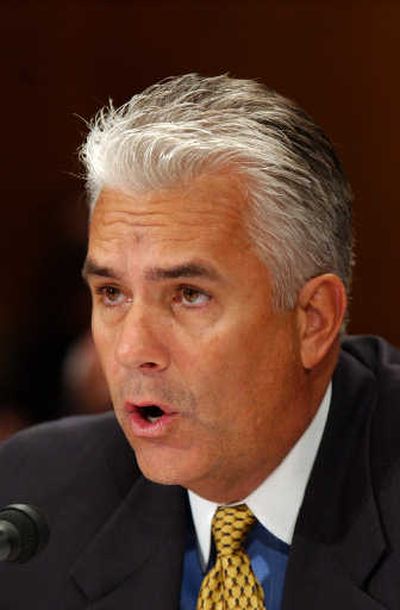Bush studies means test for drug benefits

WASHINGTON – The Bush administration is advancing a proposal to levy higher premiums and deductibles on upper-income seniors enrolled in Medicare’s new prescription drug benefit, raising fees on beneficiaries with incomes over about $80,000 a year, administration officials said Thursday.
The administration is working with Sen. John Ensign, R-Nev., to attach to upcoming legislation a “means testing” provision that would save the government billions of dollars. In the past, however, similar proposals have been blocked by the furious response of seniors.
“You say it saves money and these people can afford it, but it also eats away at the incomes of seniors. It erodes their sense of the reliability on these federal programs, and it certainly erodes political support,” said John Rother, policy director for AARP, the powerful senior lobby.
The plan was originally drafted as part of President Bush’s fiscal 2008 budget, but it died this spring with little notice. Now, at Ensign’s request, the Centers for Medicare and Medicaid Services, which administers the federal health plan for the elderly, has revived the measure.
The timing of the effort could not be worse, some Republicans said. The proposal is surfacing when Bush’s approval ratings are at record lows, his war policies are embattled and his veto this week of a children’s health insurance bill has drawn fresh fire.
Ensign put a similar proposal to a Senate vote in March. It was rejected 52 to 44.
But Ensign, who chairs the campaign committee responsible for electing Republicans to the Senate, is undaunted, vowing to add means testing to any Medicare measure that comes before the chamber.
“Working couples with incomes over $160,000 should not be subsidized by retired firefighters or schoolteachers,” he said. “They should pay more of their share.”
Already, the section of Medicare that pays for outpatient care, including doctors’ fees, imposes some means testing. Single seniors with incomes exceeding $82,000 and couples with incomes above $164,000 pay higher premiums on a sliding scale as their wealth rises. Those thresholds rise each year with inflation.
The original Bush proposal would have frozen those thresholds at $82,000 and $164,000, so more seniors would have been affected by means testing over time. The same thresholds would have applied to the new prescription drug benefit.
According to the White House budget office, the proposal would have saved more than $10 billion over five years: $7.1 billion from the physicians’ portion of Medicare and $3.2 billion from the drug coverage. The higher fees would have hit only the richest 4.3 percent of seniors enrolled in the drug program, Ensign said.
The new plan is likely to maintain inflation adjustments, Ensign said. But the senator was adamant that means testing be added to the drug benefit, and he said he has secured a strong White House commitment. The Finance Committee, of which he is a member, will probably take up legislation within weeks to stave off the scheduled cuts to physician reimbursements under Medicare.